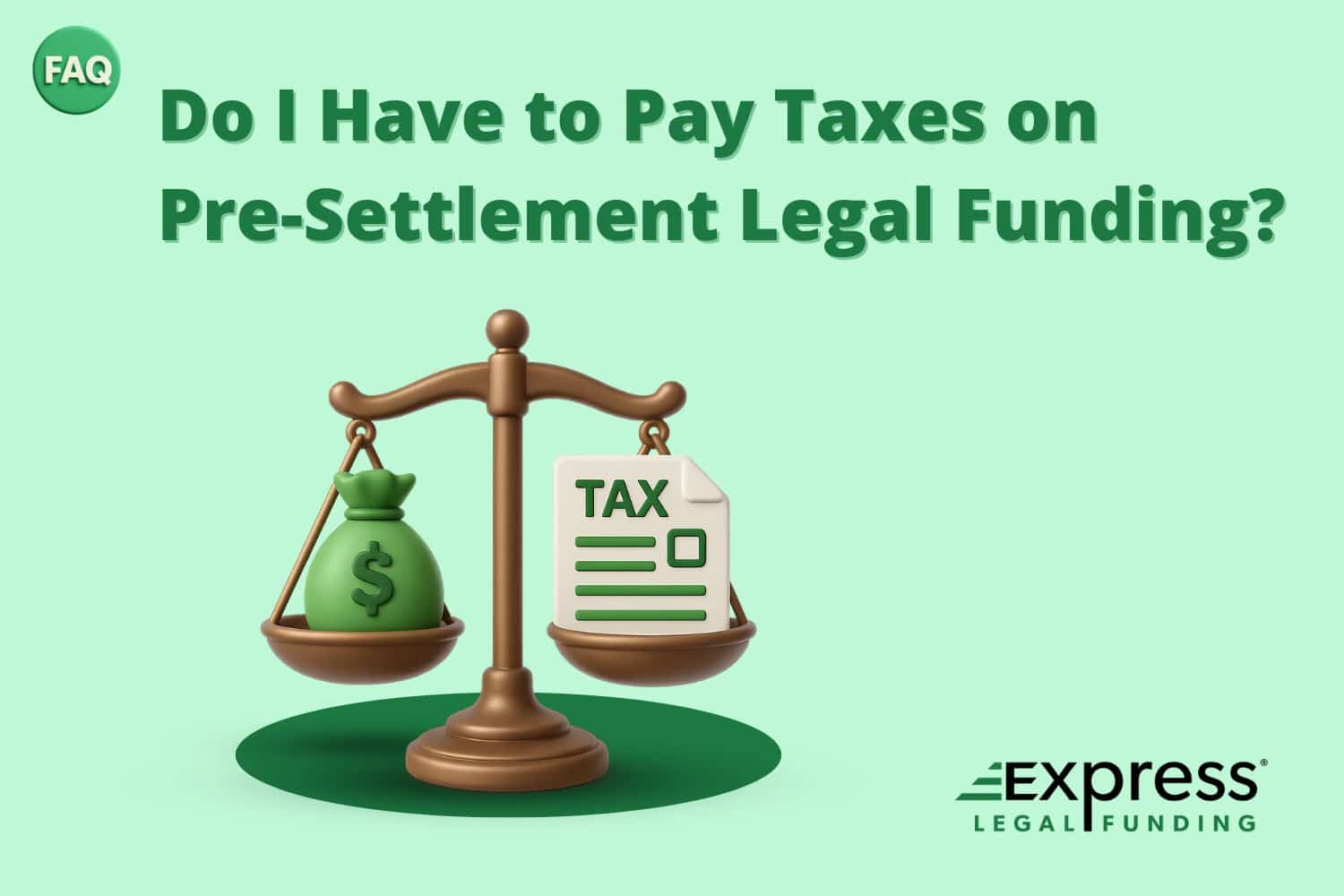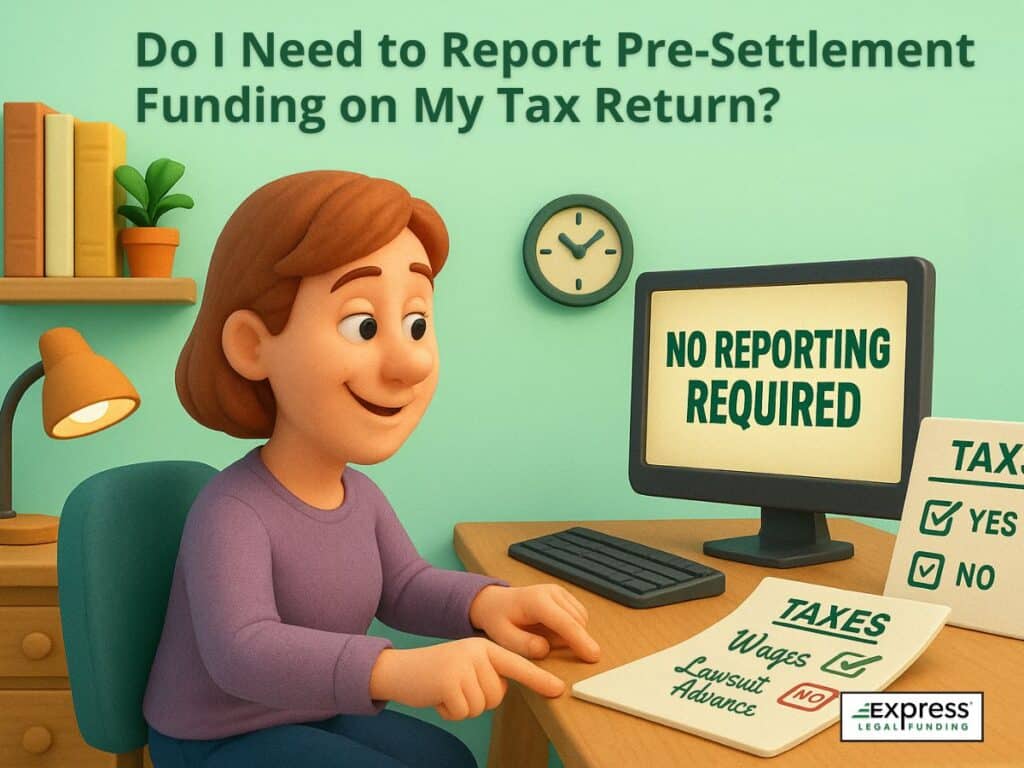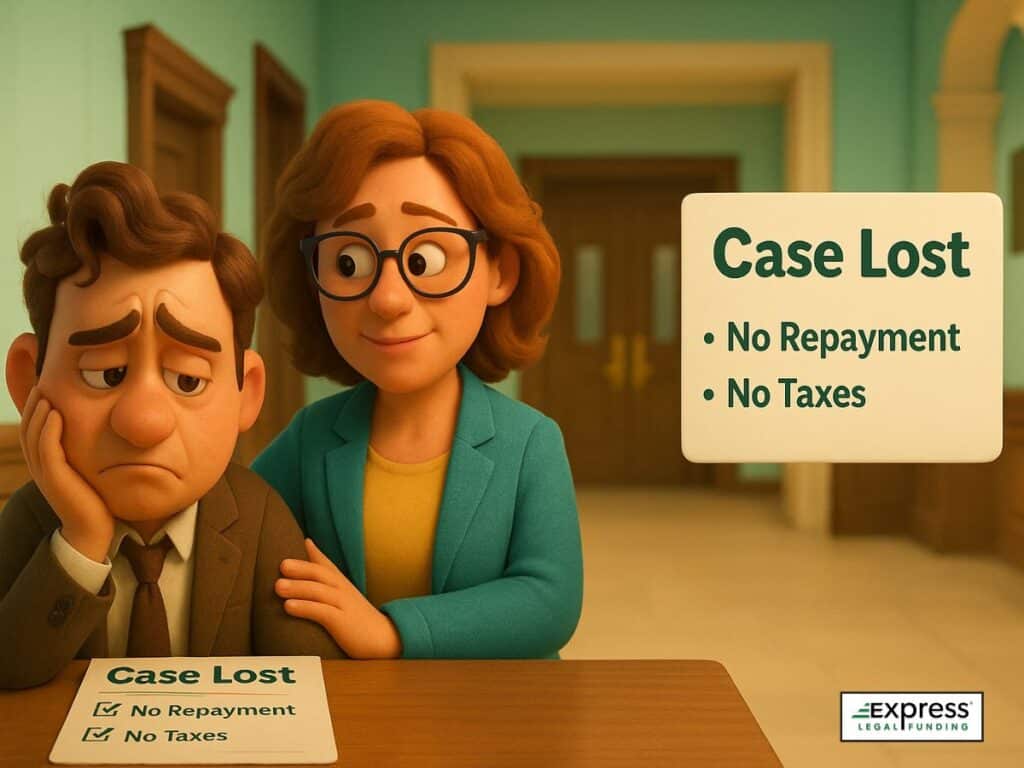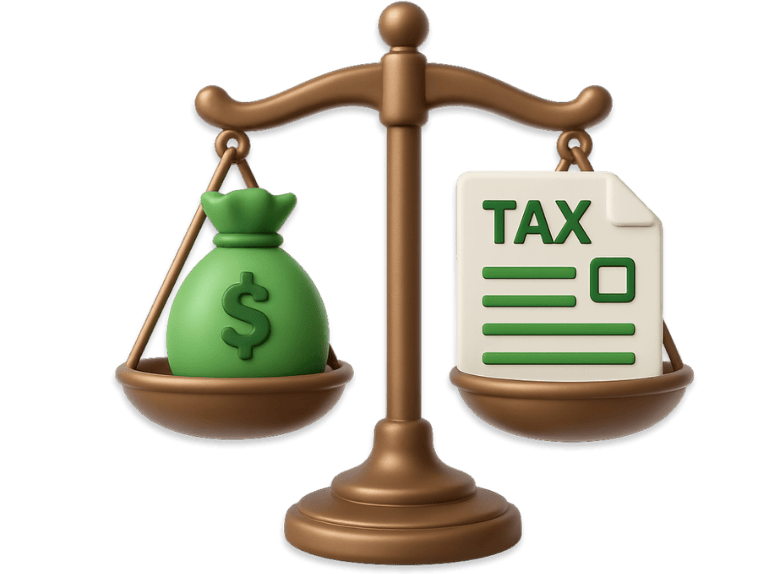FAQ: Do You Have to Pay Taxes on Pre-Settlement Legal Funding?
Pre-settlement funding, also known as a pending lawsuit loan or cash advance, is typically not treated as taxable income. Since it is structured as a non-recourse advance on your expected settlement, the Internal Revenue Service (IRS) does not include it in your gross income.
This means most plaintiffs do not need to report the funds on their tax return or pay taxes on the amount received.

However, there are a few important exceptions and tax-related considerations to keep in mind.
The FAQs below offer a clear and comprehensive explanation of how pre-settlement funding is treated for tax purposes.
Is Pre-Settlement Funding Considered Taxable Income?
No. Pre-settlement funding is not considered taxable income because it’s structured as a non-recourse debt (loan) rather than earned income.
In other words, it’s money you’re borrowing against your expected settlement, which you’ll pay back if you win your case (with no obligation if you lose).

Since it’s not wages or payment for services, the IRS does not treat it as income to you.
- IRS Classification: The Internal Revenue Service classifies most lawsuit funding as “non-recourse” advances, meaning repayment depends on winning the case. This exemption keeps the funds tax-free for the plaintiff.
- No Income Reporting: Because it’s not income, you don’t report the funding on your tax return, and no income taxes are due on it.
Do I Need to Report Pre-Settlement Funding on My Tax Return?
Generally, no. Since pre-settlement funding is not taxable income, there is no requirement to report it on your federal tax return. When filing taxes, you do not list the lawsuit advance as income or as a loan. It stands apart from your taxable earnings for the year.
This holds true for both federal and typically state taxes as well (though state laws can vary, so consult a tax advisor if in doubt).

However, it’s wise to keep records of any legal funding transactions and consult your attorney or a tax professional for your specific situation.
In rare or complex cases (e.g., if your lawsuit is not a personal injury case), a tax advisor can confirm that no reporting is needed or guide you if any special circumstance applies.
But for a standard personal injury plaintiff, no tax forms and no reporting of the settlement advance are required.
Why Is Pre-Settlement Legal Funding Not Taxed?
Pre-settlement legal funding escapes taxation because of how it’s characterized under the law. It’s essentially a contingent loan/advance rather than income. Key reasons it’s not taxed include:
- Non-Recourse Advance: Pre-settlement funding agreements are non-recourse, meaning if you lose the case, you don’t have to repay the advance. This structure means the money isn’t guaranteed income or enrichment for you – it’s contingent on a future settlement. The IRS generally does not tax loan proceeds (since loans must be repaid), and because this advance functions like a loan against your settlement, it isn’t taxed.
- Not Wages or Earnings: The cash you receive is not payment for work, services, or product – it’s simply your own potential settlement money early. The IRS excludes from income any damages received for personal physical injuries (see IRC § 104(a)(2)). Since legal funding gives you a portion of those damages in advance, it carries the same tax-exempt status as the settlement itself (in personal injury cases).
- Nature of Personal Injury Settlements: If your case is a personal injury case, the underlying settlement (for physical injuries) is tax-free by law. The advance is drawn from that non-taxable settlement pool, so the advance itself is likewise tax-free to you.
In summary, lawsuit advances are viewed as temporary financial help (to be repaid from the settlement) and not as new income. This is why you don’t pay taxes on them in most instances.
Are Lawsuit Loans or Pre-Settlement Advances Taxable?
In most cases, no. Lawsuit loans and pre-settlement advances are not taxable in the U.S. Like pre-settlement funding, other forms of litigation funding or lawsuit loans follow the same principle: they are advances on expected recoveries, not earned money.
Thus, recipients are not taxed on the funds at the time of receipt. You won’t receive a 1099 for a lawsuit loan disbursement, and you don’t list it as income on your tax filings.
Even if you see terms like “loan” or “interest” in the agreement, remember this is a special non-recourse loan – no repayment if you lose, and repayment (if you win) comes out of the settlement itself. Because of this structure, the IRS does not treat it as taxable income or forgiveness of debt.
In contrast, a typical bank loan that gets forgiven could trigger cancellation-of-debt income tax, but a pre-settlement advance is different, since it’s contingent and tied to a legal claim outcome.
Important: The tax treatment can change after your case resolves (when you actually receive a settlement or judgment). The advance itself remains non-taxable, but any monetary award you win might have taxable components. The key point here is that the act of receiving a lawsuit loan or advance is not a taxable event.
Are Personal Injury Settlements Taxable (and Does That Affect the Advance)?
Most personal injury settlements are not taxable, which is why the advances on them are also tax-free. Under U.S. tax law (IRC Section 104), compensatory damages for physical injuries or physical sickness are excluded from taxable income.
For example, if you settle a bodily injury claim (like a car accident or slip-and-fall), the money for your medical bills, pain and suffering, property damage, lost wages due to physical injury, etc., is generally tax-free at the federal level.
Since pre-settlement funding in personal injury cases is drawn from these non-taxable damages, it inherits the same tax-free status.
Taxation of Legal Settlements and Judgments
However, some types of lawsuit payouts are taxable, and it’s useful for plaintiffs to know these differences (though they don’t change the upfront funding’s tax status):
- Punitive Damages: These awards are meant to punish the defendant for egregious misconduct and to deter similar future behavior. Unlike compensatory damages, punitive damages are taxable income to the plaintiff.
- Lost Wages / Employment Claims: If part of your lawsuit is compensation for lost wages or back pay, that portion is taxable – it replaces taxable salary.
- Emotional Distress (non-physical): Damages for emotional distress or mental anguish not caused by physical injury are taxable. If it’s linked to a physical injury, it may be non-taxable.
- Interest on Settlement: Any pre-judgment or post-judgment interest that accrues on your award is taxable.
- Non-Injury Claims: Settlements for non-physical claims (e.g., defamation) are typically taxable.
Example: Jane’s personal injury case settles for $100,000: $80,000 for physical injuries (tax-free), $20,000 for punitive damages (taxable). If Jane took a $10,000 lawsuit cash advance, that advance wasn’t taxed when received. She will repay it from her settlement, and only the $20,000 punitive portion is taxed.
Will Taking a Pre-Settlement Advance Affect How Much I Pay in Taxes on My Settlement?
Not directly. Taking pre-settlement funding does not change the tax treatment of your settlement – it simply reduces the net amount you receive at the end. You won’t owe any tax on the advance itself, but you still owe taxes on any taxable portion of your settlement.
You’re generally considered to have received the full settlement, even though some of it went to repay the funder. The IRS still taxes the full taxable portion.
However, since your final disbursement may be smaller after fees, your actual tax payment that year could be lower due to reduced income in hand, but the tax liability remains based on the original taxable settlement amount.
Relevant FAQ guide: How Much Does Pre-Settlement Legal Funding Cost?
What Happens if I Use My Pre-Settlement Funds for Investments or Non-Essential Purchases?

The advance itself remains non-taxable, but any profits or gains from investing the funds are taxable. For instance, if you invest your advance and make a profit, that gain is subject to normal capital gains or business income tax.
That said, experts recommend using the funds only for necessary living expenses to avoid unnecessary costs.
The IRS focuses on whether new income is generated, not where the money came from. So, while the advance isn’t taxed, using it to create taxable income (like from an investment) will result in tax obligations.
If I Lose My Case, Do I Owe Taxes on the Pre-Settlement Funding I Received?

No. If you lose your case, you don’t repay the funding, and you don’t owe taxes on it either. Lawsuit advances are non-recourse, meaning the funding company assumes the risk. The IRS doesn’t consider these advances as income in the event of non-repayment.
Unlike typical forgiven loans, which can trigger cancellation-of-debt tax liability, lawsuit funding is structured to be contingent from the start. So, no 1099-C is issued, and no tax is due.
Will I Receive a 1099 or Tax Form for Pre-Settlement Funds?
No, not for the funding itself. Legal funding companies do not issue 1099s for advances because they aren’t wages or income. However, you might receive a 1099 for the settlement itself, particularly if it includes punitive damages, interest, or other taxable elements.
If your entire settlement is tax-free (e.g., for personal physical injury), no 1099 is typically issued. But if you receive one, consult your attorney or tax advisor to properly report any taxable portions.
Does Pre-Settlement Funding Affect My Credit or Financial Situation (Beyond Taxes)?
No, it doesn’t impact your credit score. Pre-settlement funding is not reported to credit bureaus and does not require a credit check. Because it’s non-recourse and tied to your lawsuit, it doesn’t appear on your credit report or affect your score even if you lose your case.
Need Fast Pre-Settlement Funding? Apply Today with Express Legal Funding
Waiting on your lawsuit shouldn’t mean falling behind on bills. At Express Legal Funding, we offer fast, risk-free pre-settlement cash advances to help you stay financially stable while your case moves forward.
- No income verification.
- No credit checks.
- No monthly payments
- No repayment if you lose.
Apply today, and you can receive the funds you need within 24 hours of approval. Thousands of satisfied clients have trusted Express Legal Funding for fast and reliable financial support while waiting for their settlements.
👉 Apply for Legal Funding or call us directly at (888) 232-9223 for immediate assistance.

